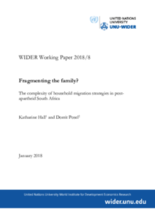Abstract:
The disruption of family life is one of the important legacies of South Africa’s colonial and apartheid history. Families were undermined by deliberate strategies implemented through the pass laws, forced removals, urban housing policy, and the creation of the homelands. Despite the removal of legal restrictions on permanent urban settlement and family co-residence for Africans, patterns of internal and oscillating labour migration have endured, dual or stretched households continue to link urban and rural nodes, children have remained less urbanized than adults, and many grow up without co-resident parents. Although children are clearly affected by adult labour migration, they have tended to be ignored in the migration discourse. A focus on children provides an unusual lens for considering migration dynamics and can help to advance an understanding of the complexities of household arrangements and migration processes for families. In this mixed methods study, we use nationally representative panel data to investigate migration patterns when viewed from the perspective of children. We then draw on a detailed case study to reflect on the contributions of quantitative and qualitative data sources for enhancing our understanding of the migration strategies undertaken by families

